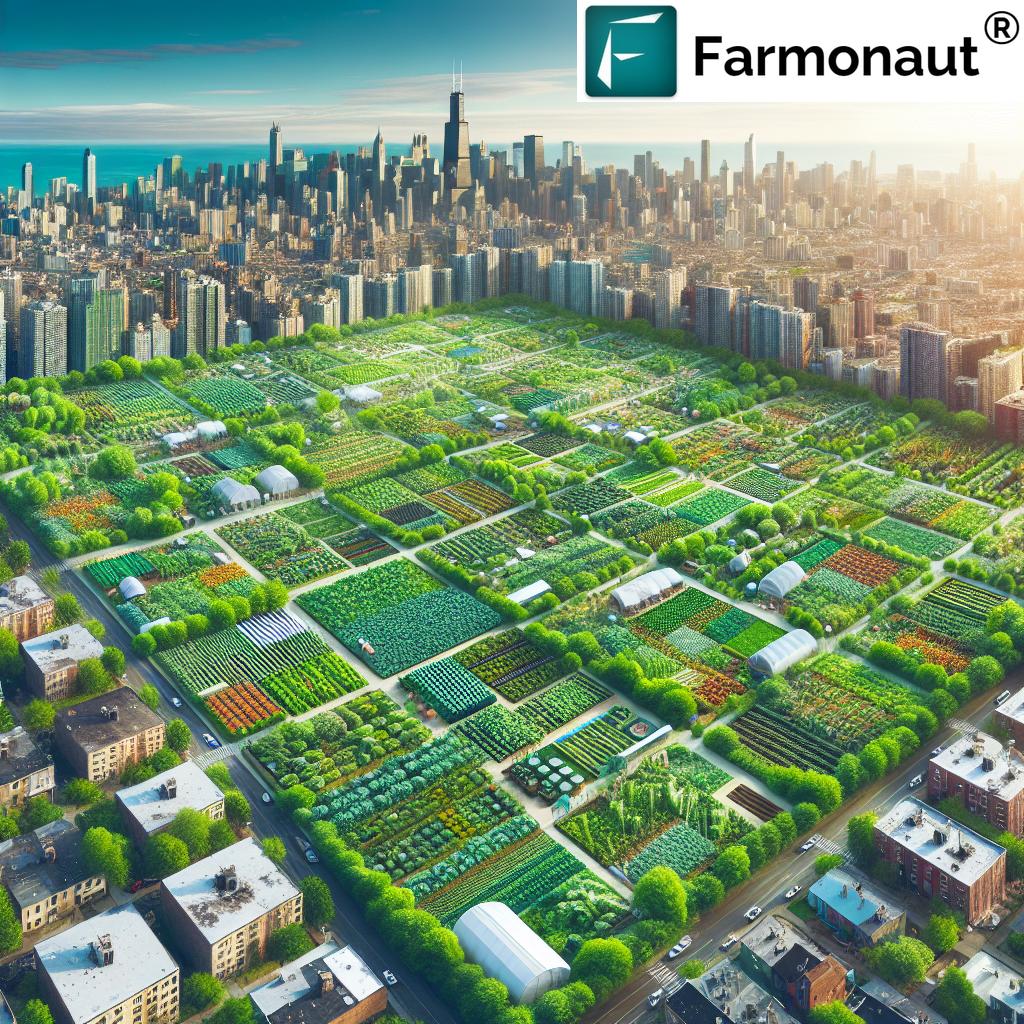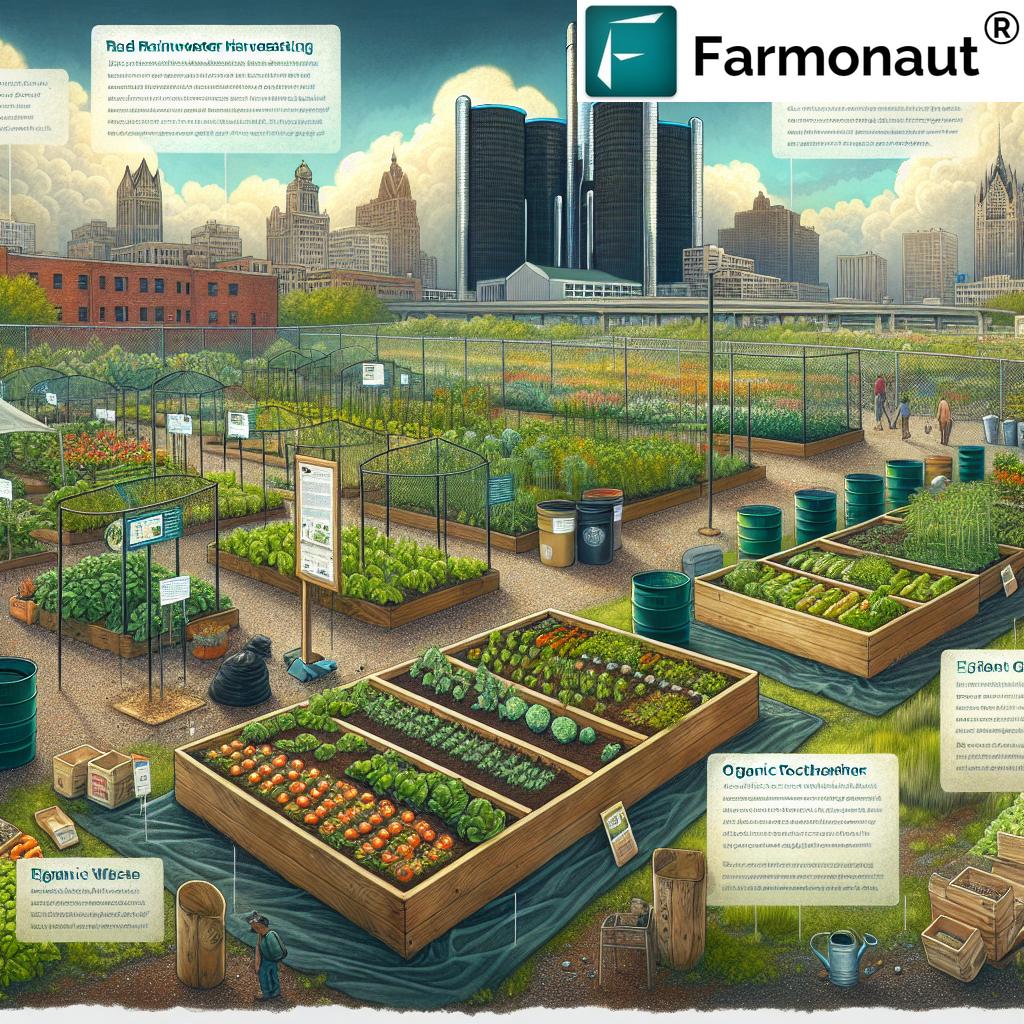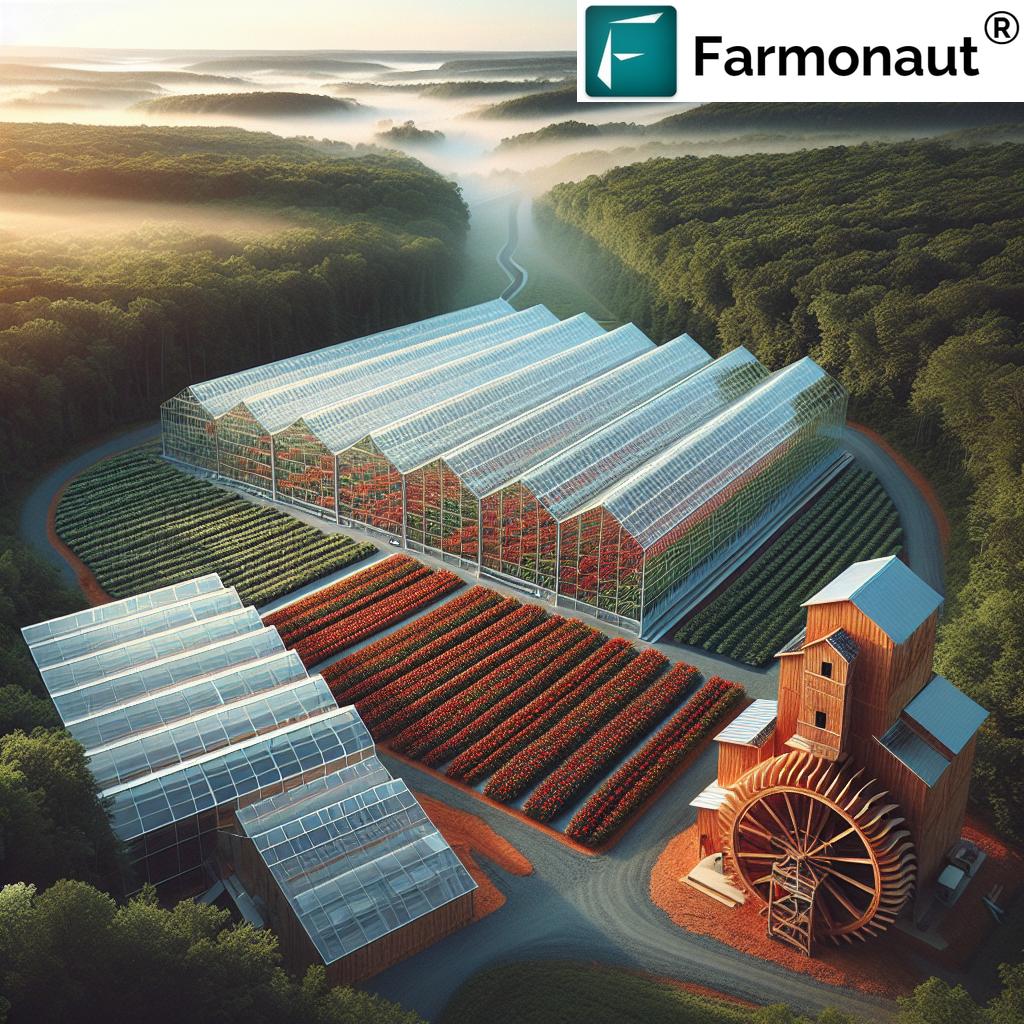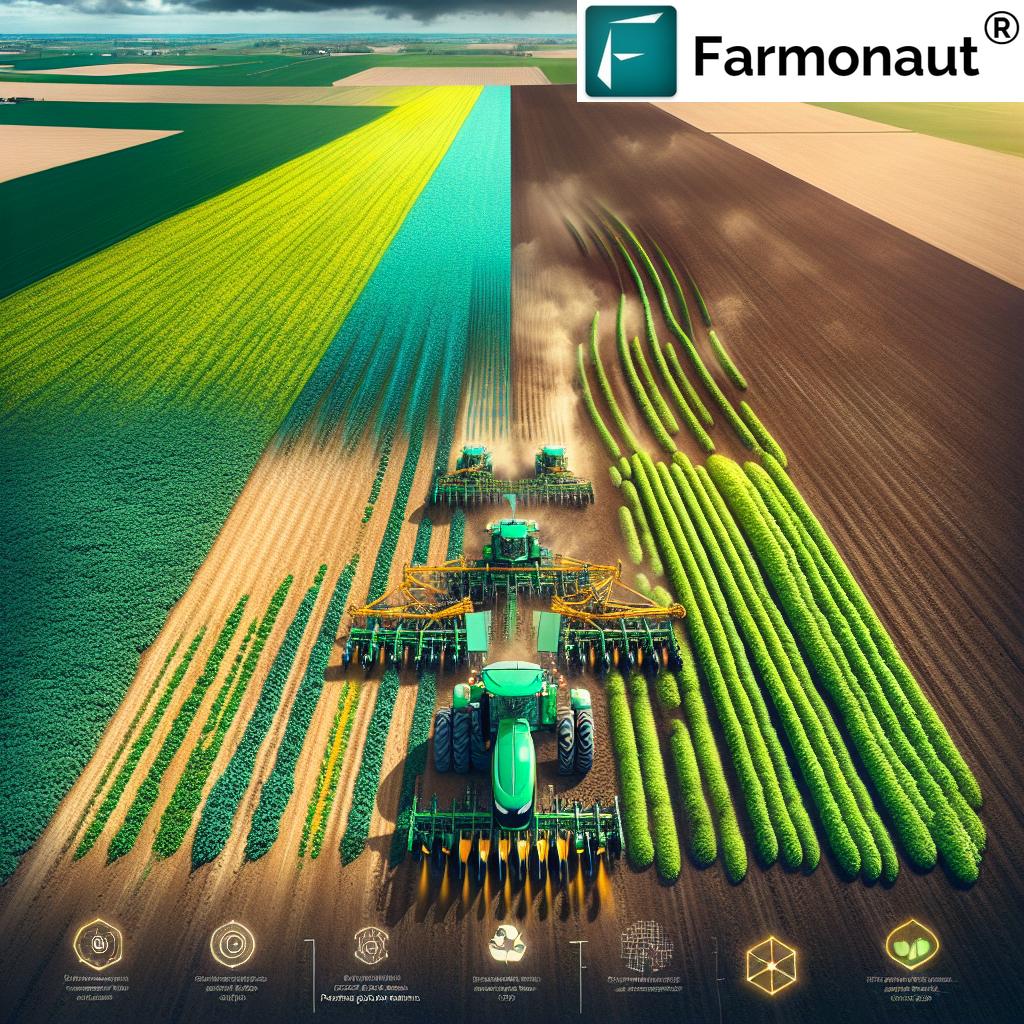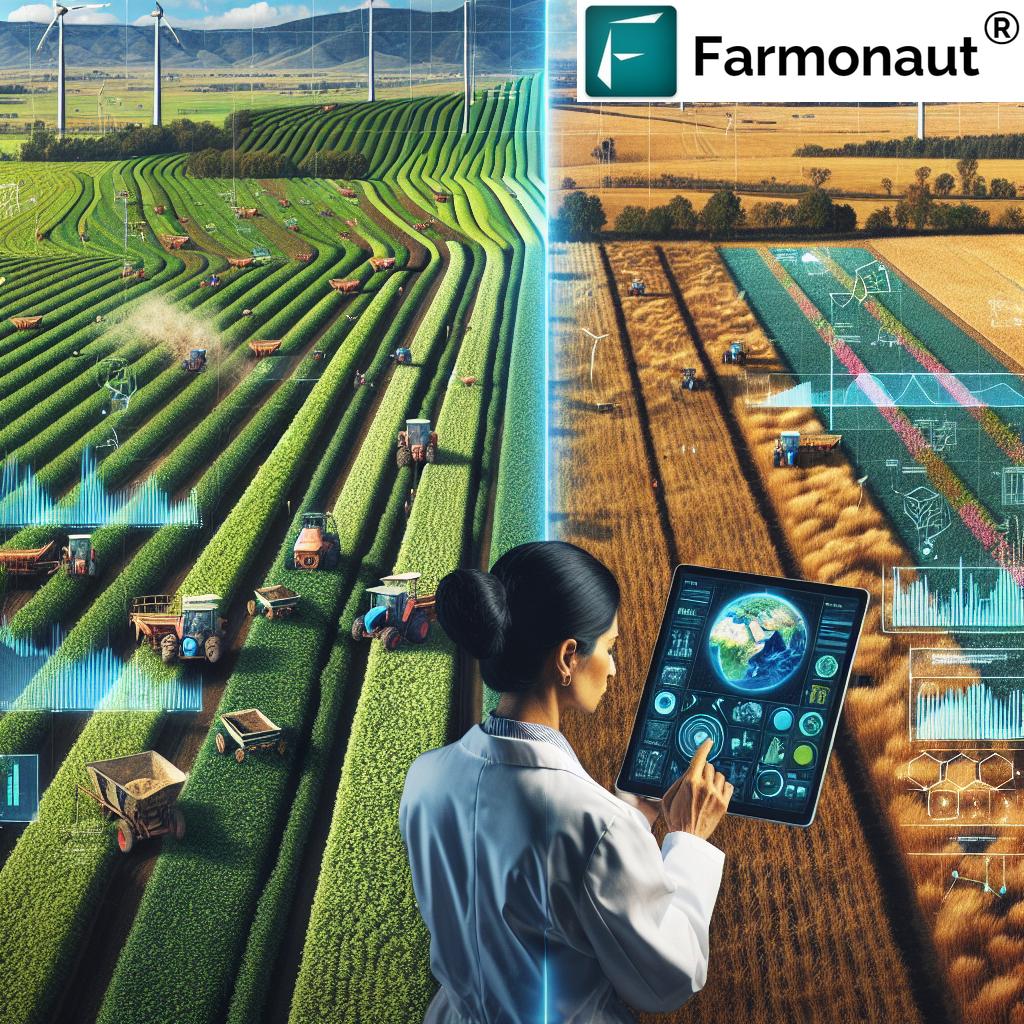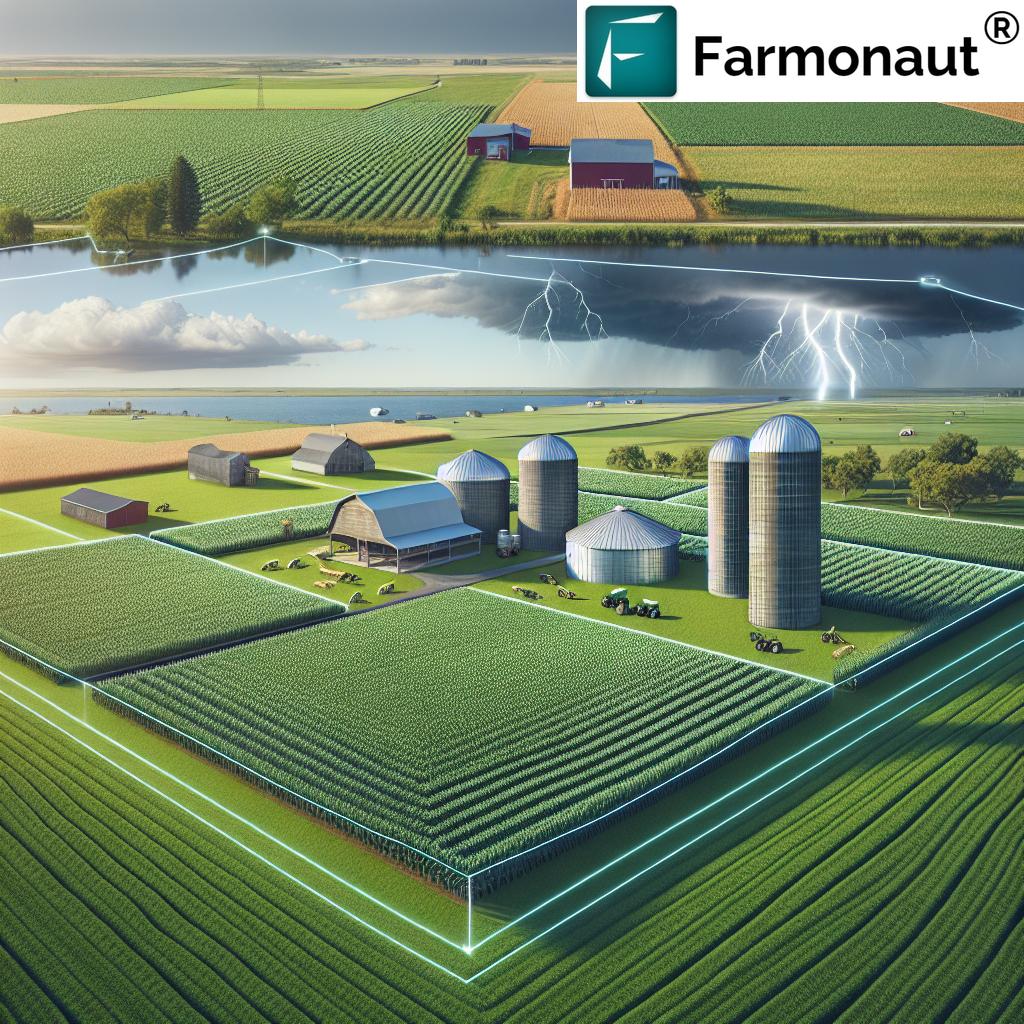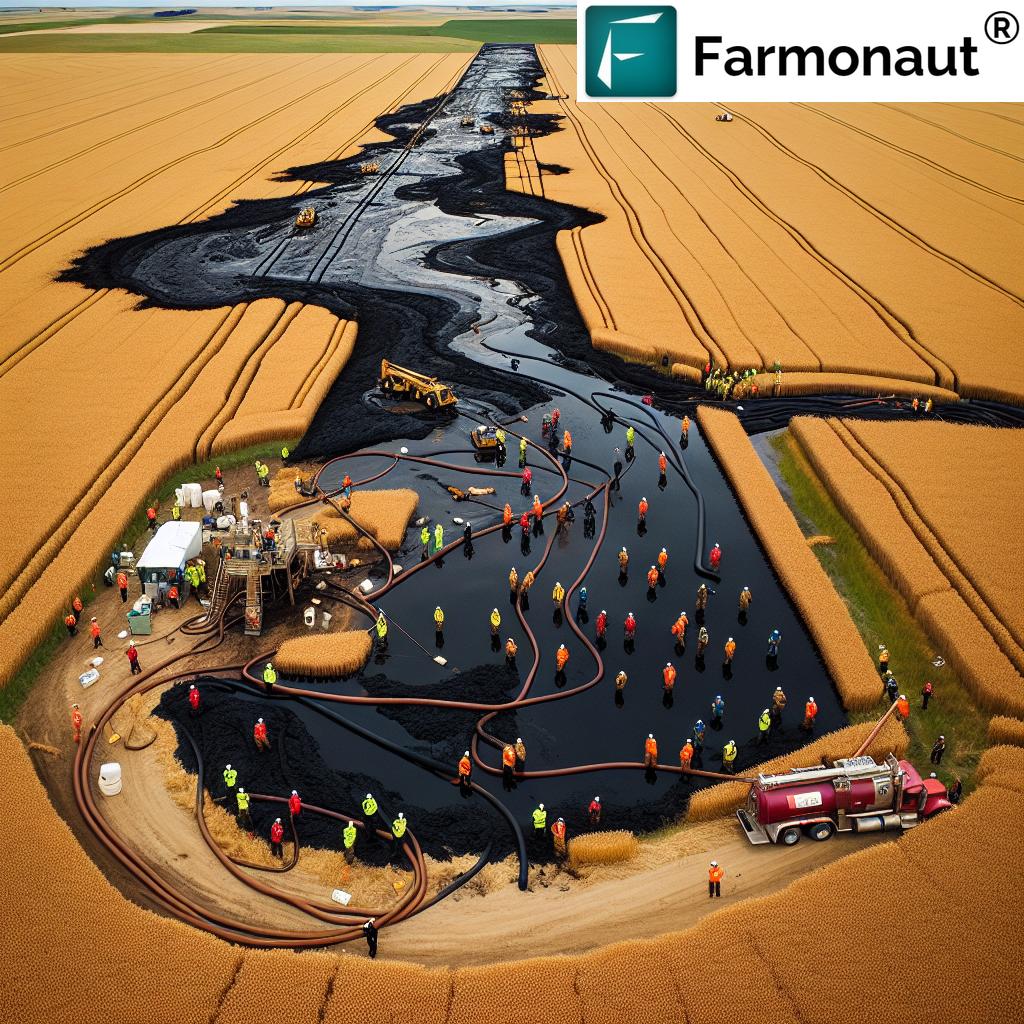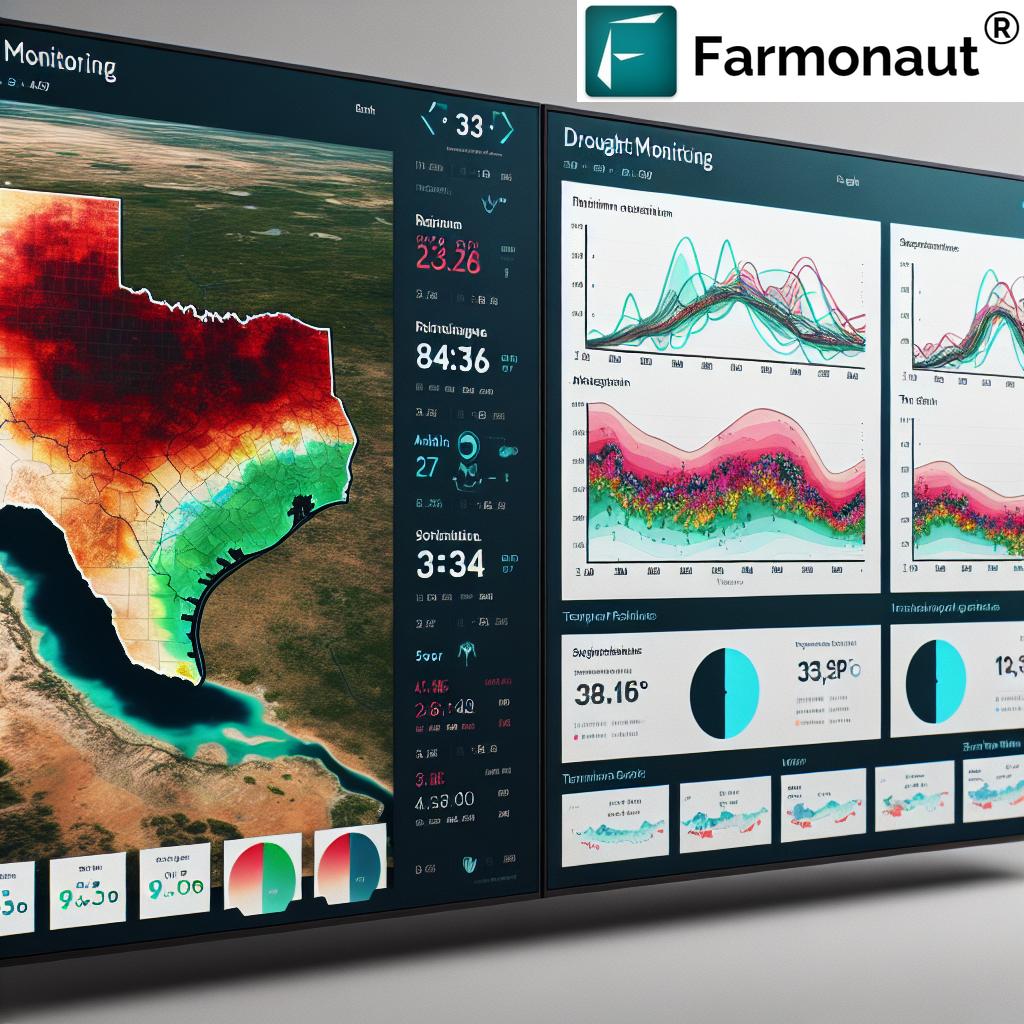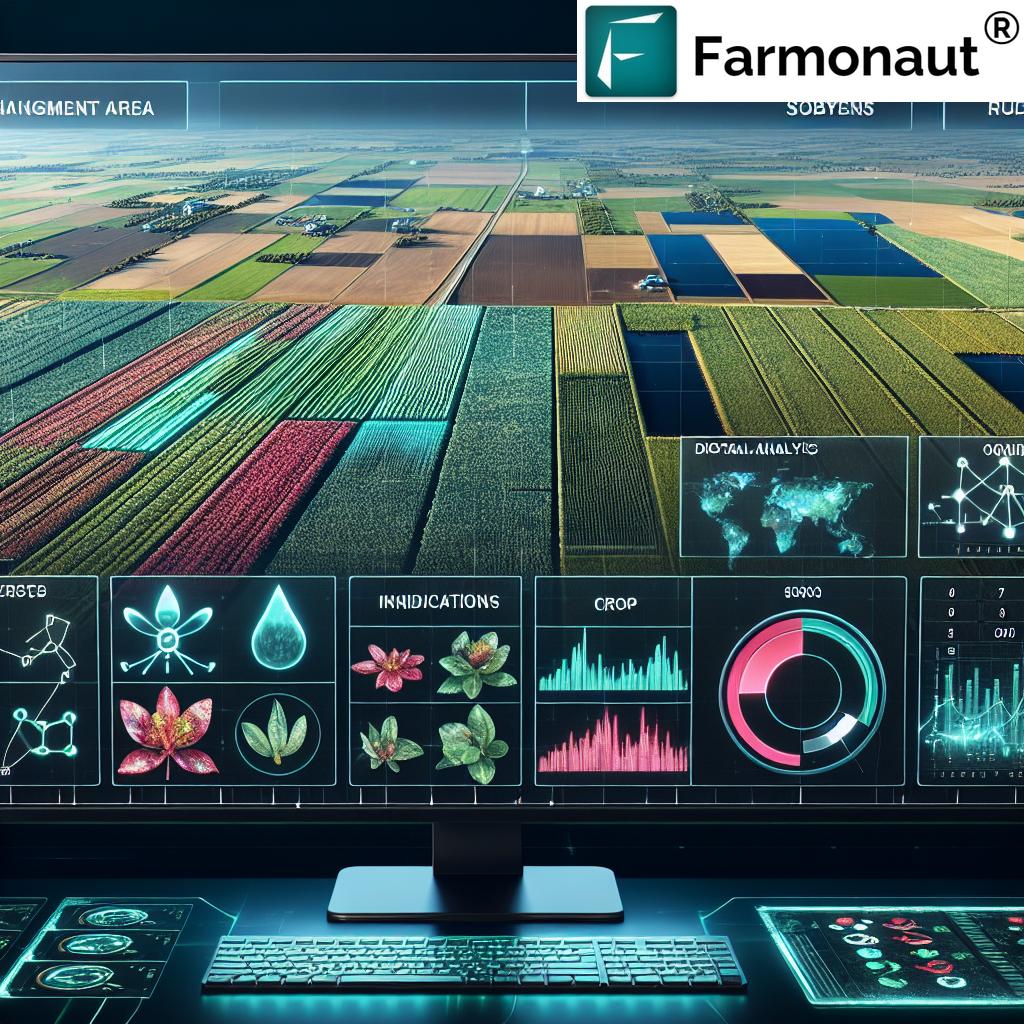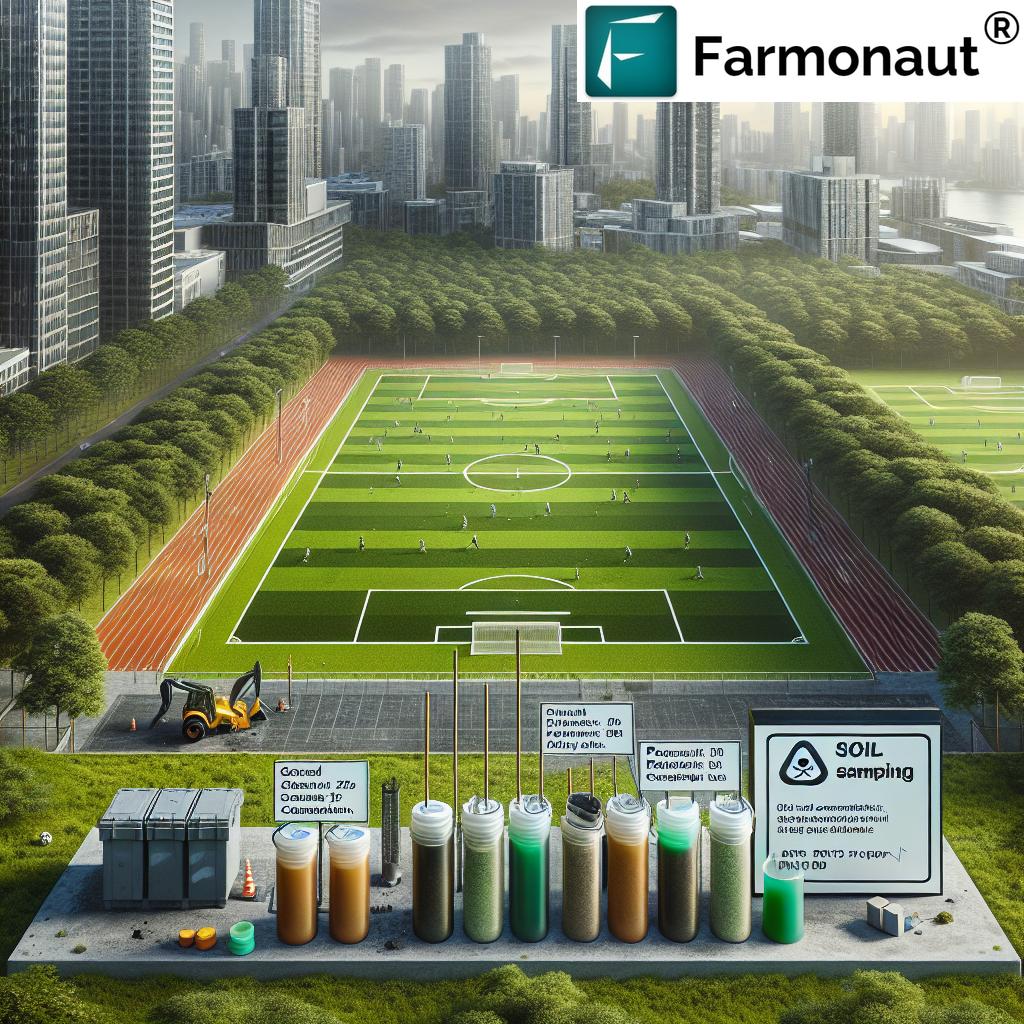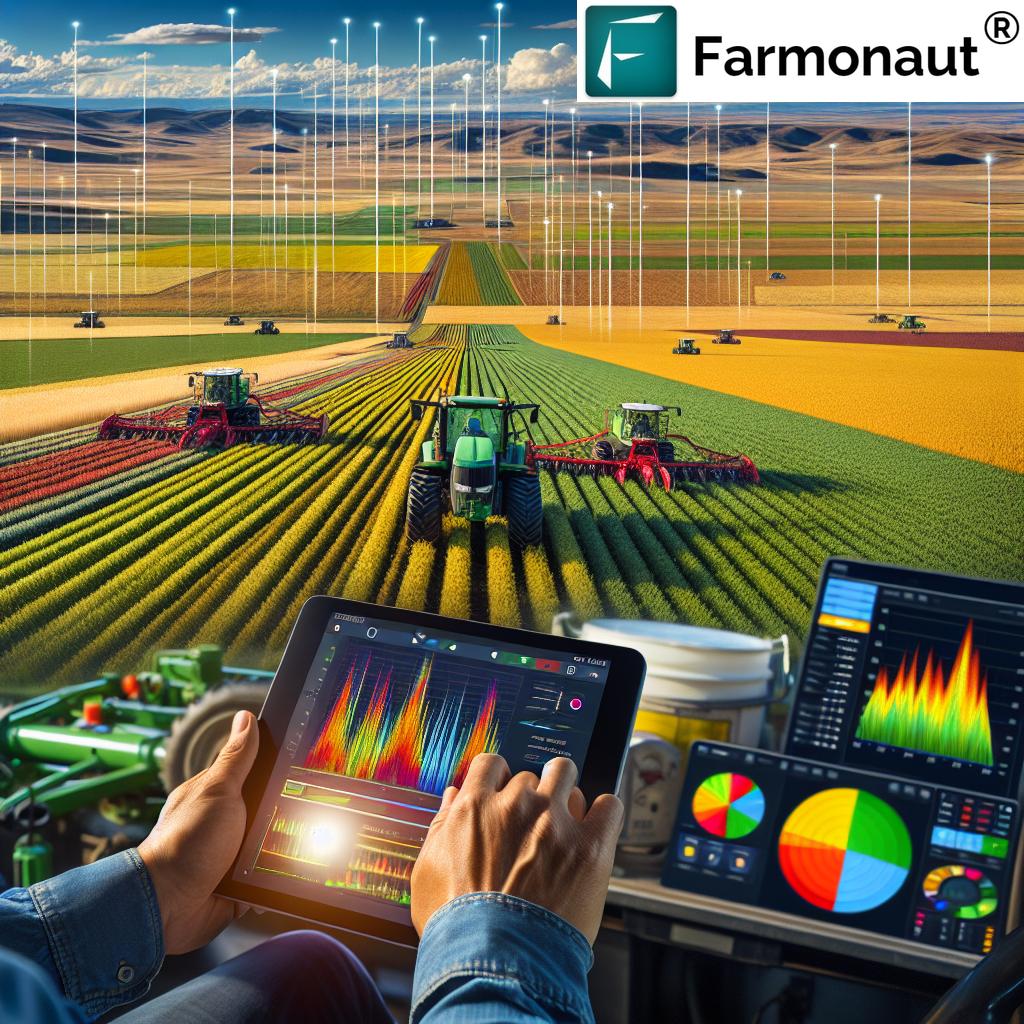Urban Agriculture Sustainability: 7 Benefits for Detroit
- Introduction: The Promise of Urban Agriculture Sustainability
- Detroit’s Context: Why Urban Agriculture Matters Here
- 7 Key Benefits of Urban Agriculture for Detroit
- 1. Improved Food Access and Security
- 2. Reduction of Food Miles and Carbon Emissions
- 3. Environmental Resilience: Heat, Green Spaces & Biodiversity
- 4. Economic Sustainability: Jobs & Local Development
- 5. Social Sustainability and Community Cohesion
- 6. Enhanced Educational Opportunities
- 7. Elevated Property Values and Neighborhood Revitalization
- Benefit Impact Summary Table
- Farmonaut: Technology for Sustainable Urban Farming
- Urban Farming Challenges & Considerations
- Urban Agriculture Sustainability FAQ
- Conclusion: A Sustainable Urban Future for Detroit
Introduction: The Promise of Urban Agriculture Sustainability
Urban agriculture sustainability has quickly become a cornerstone in addressing some of the most urgent challenges faced by modern cities. As we collectively strive for a future marked by social equality, environmental health, and economic resilience, the practice of growing, cultivating, processing, and distributing food within urban settings represents not just a trend, but a necessary shift in our approach to city living.
In recent years, the concept of urban food production has evolved from community plots and gardens to innovative sustainable urban farming systems, rooftop greenhouses, indoor vertical farms, and technological platforms that bring unprecedented efficiency and transparency. In Detroit, these advances are transforming neighborhoods, enhancing food security, and providing tangible solutions for sustainability in cities.
Our exploration today dives deep into the multifaceted urban agriculture benefits, with a particular focus on Detroit—a city at the forefront of reimagining urban environments for sustainability. We will discuss environmental, economic, and social dimensions, the reduction of food miles, carbon emissions, and the role of new technologies. We also share actionable resources, local tools, and direct insights for local communities and urban farmers.
Detroit’s Context: Why Urban Agriculture Matters Here
Detroit is uniquely positioned to lead the urban agriculture movement. With vast underutilized land, a history of food insecurity, and communities eager for revitalization, the city exemplifies both the challenges and opportunities inherent in sustainable urban farming. Here, abandoned lots are being transformed into productive farms and community gardens—vital green spaces that improve the environment and support local economies.
The significance of Detroit’s efforts lies not only in their impact on local food systems but also as a model for cities worldwide. As we explore each benefit, we’ll show why Detroit’s experience is both unique and universally relevant in the pursuit of environmental sustainability in cities.
7 Key Benefits of Urban Agriculture for Detroit
Let’s break down the seven most impactful urban agriculture benefits for Detroit, focusing on their environmental, economic, and social implications as well as their real-world relevance for local communities.
1. Improved Food Access and Security
One of the most compelling motivations for urban agriculture is its power to improve food access in urban areas. Detroit, historically home to numerous food deserts, has seen a critical increase in the availability of fresh produce thanks to community gardens in cities, schoolyard plots, and local farms.
- Reducing Urban Food Deserts: Urban farming directly counters food inequality by making fresh, nutritious food locally available in neighborhoods that previously lacked access.
- Boosting Nutrition: By increasing the presence of affordable fruits, vegetables, and herbs, local farms support better dietary habits and overall health outcomes for Detroit’s residents.
- Empowering Communities: Providing opportunities for residents to participate in food production increases community resilience and food security while fostering education and engagement.
Detroit’s initiatives have directly contributed to a 30% increase in access to fresh food in underserved neighborhoods since 2015—a testament to the power of growing locally in addressing urban food challenges.
2. Reduction of Food Miles and Carbon Emissions
A sustainable urban farming ecosystem allows us to rethink how food gets from farm to table. Reducing food miles—the distance food travels before it reaches us—not only lowers transportation costs but also significantly decreases our collective carbon footprint.
- Minimizing Emissions: Local production eliminates the need for long-haul trucks, refrigerated transport, and energy-intensive supply chains, leading to a marked reduction in greenhouse gas emissions tied to the food system.
- Fresher, Healthier Food: Shorter journeys mean less spoilage, higher nutritional content, and fewer preservatives.
- Localized Distribution: By building robust local food systems, cities like Detroit foster food sovereignty, independence, and sustainability.
Detroit’s urban agriculture initiatives have reduced food transportation emissions by up to 20% annually, amplifying the environmental sustainability in cities and making a direct positive impact on local air quality and community health.
To optimize carbon reduction strategies on urban farms, advanced technology like
Farmonaut’s Carbon Footprinting Tool
provides real-time farm emission data. This service empowers urban growers in Detroit to track, benchmark, and reduce their operations’ carbon footprint, contributing to sustainability goals and environmental stewardship.
3. Environmental Resilience: Heat, Green Spaces & Biodiversity
Urban agriculture is more than food—it’s about creating healthier, more resilient urban environments. Let’s explore three environmental sustainability aspects propelled by sustainable urban farming:
-
Mitigation of Urban Heat Island Effect:
- Urban gardens and green roofs absorb heat, lower ambient temperatures, and release oxygen—helping cool concrete-heavy neighborhoods and mitigating the urban heat island effect that raises city temperatures above those of rural surroundings.
- Efforts in Detroit have enhanced the livability of urban spaces vulnerable to excessive summer heat.
-
Promotion of Biodiversity:
- Local farms host diverse plant species and habitats for pollinators and beneficial insects.
- This contributes to the preservation of urban biodiversity and supports Detroit’s ecosystem resilience.
-
Green Space Creation:
- The transformation of vacant lots into productive agricultural spaces yields cleaner air, healthier soils, and new recreational areas, creating positive ripple effects throughout neighborhoods.
The incorporation of green spaces within Detroit’s urban fabric demonstrates how urban agriculture sustainability addresses critical environmental challenges while promoting community well-being.
Ensuring environmental and food safety requires transparency. Urban growers can now secure the provenance of their products with tools like
Farmonaut’s Blockchain-based Traceability Solution. This not only boosts consumer trust but also supports accountability and sustainability throughout urban food production.
4. Economic Sustainability: Jobs & Local Development
A thriving urban agriculture sector serves as a powerful driver for local economic development. Detroit’s farms and gardens offer more than food—they offer employment opportunities, entrepreneurial ventures, and broader community investment.
- Job Creation: Positions range from farm managers and educators to greenhouse staff, drivers, and produce distributors—providing much-needed employment in many underserved neighborhoods.
- Entrepreneurship: Urban agriculture spurs new business models—subscription produce boxes, value-added products, and farmers’ markets—all supporting a local food economy.
- Cost Savings: By reducing the need to import food, Detroit’s local food systems lower transportation costs, reduce spoilage, and keep dollars circulating within local communities.
Through these mechanisms, urban farming enhances economic resilience, creates wealth at the community level, and drives the kind of neighborhood revitalization Detroit needs for its next chapter.
For larger organizations, cooperatives, or city agencies, Farmonaut’s Large Scale Farm Management Platform enables efficient planning, resource allocation, and crop tracking across many urban plots, ensuring that both productivity and environmental sustainability targets are met.
5. Social Sustainability and Community Cohesion
Urban agriculture does more than feed cities—it binds them together. Community gardens in cities like Detroit are hubs for engagement, cultural exchange, and collective action.
- Building Stronger Communities: Shared gardens and farms connect neighbors, foster mutual support, and create opportunities for collaborative problem-solving.
- Reducing Social Isolation: Communal urban farming activities encourage participation across ages and backgrounds, addressing loneliness and building social cohesion.
- Empowering Marginalized Groups: Programs often specifically serve youth, women, seniors, and immigrants, turning farms into inclusive spaces where everyone has a voice and a role.
This practice of cultivating food together makes a city more resilient—socially, politically, and economically.
6. Enhanced Educational Opportunities
Urban agriculture is a natural classroom. In Detroit, community farms partner with schools, nonprofits, and civic groups to deliver hands-on environmental education, skills training, and nutrition workshops.
- Science and Sustainability: Kids and adults learn about plant biology, soil health, climate impacts, and sustainable practices that benefit Detroit’s environment.
- Career Pathways: Urban agriculture introduces youth to green jobs and entrepreneurship, supporting the city’s long-term workforce development goals.
- Nutrition & Cooking: Educational gardens teach residents about healthy eating and self-sufficiency.
By integrating education into our local food systems, Detroit is cultivating the next generation of stewards and sustainability champions.
Tech-driven education and research programs can now access real-time weather data, satellite imagery, and field information via the
Farmonaut Satellite API and Developer Docs—empowering educators, developers, and agritech startups in Detroit to innovate.
7. Elevated Property Values and Neighborhood Revitalization
Well-managed urban farms increase the visual and social appeal of neighborhoods—raising property values and sparking broader redevelopment. In Detroit, transitioning abandoned lots into green, productive spaces leads to safer streets, increased investment, and community pride.
- Neighborhood Beautification: Lush, green urban gardens act as attractive amenities, drawing renters, homebuyers, and businesses to invest locally.
- Crime Reduction: Active, well-maintained spaces deter illegal dumping and illicit activities.
- Community-Led Revitalization: Residents who participate in urban farming are more likely to lead other improvement projects, creating a virtuous cycle of positive change.
This final benefit underscores how urban agriculture sustainability offers long-lasting, city-wide impact—transforming Detroit’s reputation and day-to-day realities.
Benefit Impact Summary Table: Urban Agriculture Sustainability in Detroit
| Benefit | Description |
Estimated Impact (Environmental) |
Estimated Impact (Economic) |
Estimated Impact (Social) |
Detroit Relevance/Example |
|---|---|---|---|---|---|
| Improved Food Access | Expanding local, fresh produce availability, reducing food deserts | Medium | Medium | High | Food access up 30% in underserved Detroit neighborhoods |
| Reduction of Food Miles & Carbon Emissions | Local food production cuts transportation distance and greenhouse gases | High | Medium | Medium | 20% annual drop in food transport emissions citywide |
| Environmental Resilience (Heat/Biodiversity/Green Spaces) | Mitigates heat island effect, boosts urban biodiversity, and adds green space | High | Low | Medium | Hundreds of vacant lots greened, biodiversity on the rise |
| Economic Sustainability | Creation of jobs and new business opportunities | Low | High | Medium | Est. dozens of new farm-based jobs and businesses in Detroit |
| Community Cohesion | Supports social inclusion, local participation, and shared identity | Low | Low | High | Community gardens as gathering spaces citywide |
| Educational Opportunities | Hands-on learning and training in environmental stewardship and nutrition | Medium | Medium | High | STEAM programs, nutrition classes in Detroit schools |
| Elevated Property Values | Improved neighborhood image, attracts new residents/investment | Medium | High | Medium | Property values rise where urban farms established |
Farmonaut: Technology for Sustainable Urban Farming
As we deepen our commitment to urban agriculture sustainability, technology plays a pivotal role. Farmonaut, a pioneering agricultural technology company, helps empower Detroit’s growers with affordable, accessible, and highly scalable digital tools. Let’s take a closer look at how our technology aligns with Detroit’s urban agriculture movement.
Satellite-Driven Urban Farm Management
- Crop Health Monitoring: Using satellite imagery, Farmonaut gives farmers and garden managers insight into real-time vegetation health, soil moisture, and climate data. This enables efficient resource use and supports environmentally sustainable farming practices in urban settings.
- AI-Powered Advisory (Jeevn): Our unique AI advisory platform delivers actionable tips for irrigation, pest control, and input reduction—helping maximize yield and sustainability, even for small Detroit plots.
- Blockchain Traceability: From farm to table, our traceability tech ensures food origins are transparent and secure—a vital consideration for urban farmers engaging local markets and restaurants.
- Carbon Footprint Tracking: Urban growers can monitor and lower their environmental impact, contributing directly to climate mitigation and local clean air goals.
Farmonaut’s platform, available via Android, iOS, web, and API, makes precision agriculture practical for Detroit’s farmers. Subscription packages—see below—support individual plots, community associations, and enterprise-scale operations.
Resource, Fleet, and Financial Tools for Urban Growers
-
Fleet Management
: Keep track of shared equipment, drivers, and produce deliveries for collectives or cooperatives—cutting costs and improving resource management. -
Crop Loan and Insurance Verification
: Use satellite data for fast, transparent verification of acreage and yield—improving access to financial resources for new urban farmers and nonprofits in Detroit.
With a mission to democratize precision agriculture worldwide, Farmonaut offers Detroit’s urban growers the ability to maximize yields, conserve water and land, improve financial access, and demonstrate compliance with city and state sustainability goals.
Urban Farming Challenges & Considerations
While the urban agriculture movement holds immense promise, especially in Detroit, realizing its full potential requires careful navigation of several persistent challenges:
1. Land Availability and Zoning
- Competition for urban land can limit the expansion and stability of community gardens. Many neighborhoods still face restrictive zoning ordinances or conflict with commercial development priorities.
- Advocacy, partnership with city planners, and policy innovation are essential to claim and secure underutilized land for agricultural purposes.
2. Resource and Environmental Management
- Efficient use of water, soil, and energy is critical for long-term success. Systems like hydroponics and aquaponics help conserve resources but may require upfront knowledge and investment.
- Best practices—rainwater harvesting, composting, and renewable energy—should be adopted to further reduce environmental impact.
3. Economic Viability
- Urban farms must be financially sustainable, with robust business models, market support, and diversified income sources.
- Value-added products, farm-to-table programs, and education workshops help buffer revenue and ensure long-term operations.
- Urban food enterprises may need help accessing loans or insurance; tools such as Farmonaut’s crop loan verification can make a difference for Detroit’s new farmers.
4. Equity and Inclusion
- Not all Detroit neighborhoods have equal access to land, funding, or education. Urban agriculture initiatives must intentionally serve the city’s most marginalized communities and reflect local voices in planning, management, and benefit-sharing.
Urban Agriculture Sustainability FAQ
What is urban agriculture and why is it important in Detroit?
Urban agriculture refers to the sustainable practice of cultivating, processing, and distributing food within city environments. In Detroit, it addresses critical issues like food insecurity, vacant land revitalization, job opportunities, and environmental resilience.
How does urban agriculture improve sustainability in cities?
Urban agriculture enhances sustainability by reducing food miles and carbon emissions, mitigating urban heat, supporting biodiversity, creating green spaces, generating economic activity, and strengthening social and community resilience.
How can technology support urban agriculture in Detroit?
Technology such as Farmonaut’s platform leverages real-time satellite imagery, AI-driven advisories, blockchain traceability, and resource optimization to empower Detroit’s urban growers to maximize yields, manage risk, and meet environmental goals.
What are the environmental benefits of community gardens and urban farms?
Community gardens and urban farms in Detroit cool the city, improve air quality, manage stormwater, and attract pollinators, making neighborhoods more livable and resilient to climate change.
Are there economic incentives for urban farming in Detroit?
Yes—urban farming supports job creation, entrepreneurship, reduced food costs, and increased property values. Programs and new fintech solutions assist in accessing loans, insurance, and marketing opportunities.
How can Detroit residents get involved in urban agriculture?
Residents can join local community gardens, volunteer at urban farms, enroll in educational workshops, or use technology like Farmonaut’s app to learn about sustainable practices, track garden performance, and maximize their impact.
Where can I download the Farmonaut app?
You can access the web app here, get it from the Google Play Store here, or from the Apple App Store here.
Conclusion: A Sustainable Urban Future for Detroit
Urban agriculture sustainability is not just a visionary idea—it’s a practical, proven pathway for Detroit and cities worldwide to cultivate healthier, more resilient, and more equitable futures. As our local food systems grow stronger, we create environments that are less polluting, more nourishing, and better equipped for the challenges ahead.
Detroit’s leadership in this movement, powered by innovation, strong community engagement, and cutting-edge solutions like Farmonaut, offers hope and a blueprint for others seeking to reconcile urban living with planetary boundaries.
By embracing the multifaceted aspects of sustainable urban farming—environmental restoration, economic opportunity, social integration, and technological advancement—we become true stewards of our city, our health, and our planet.





